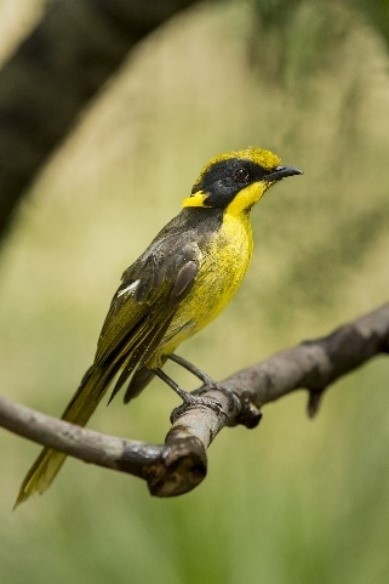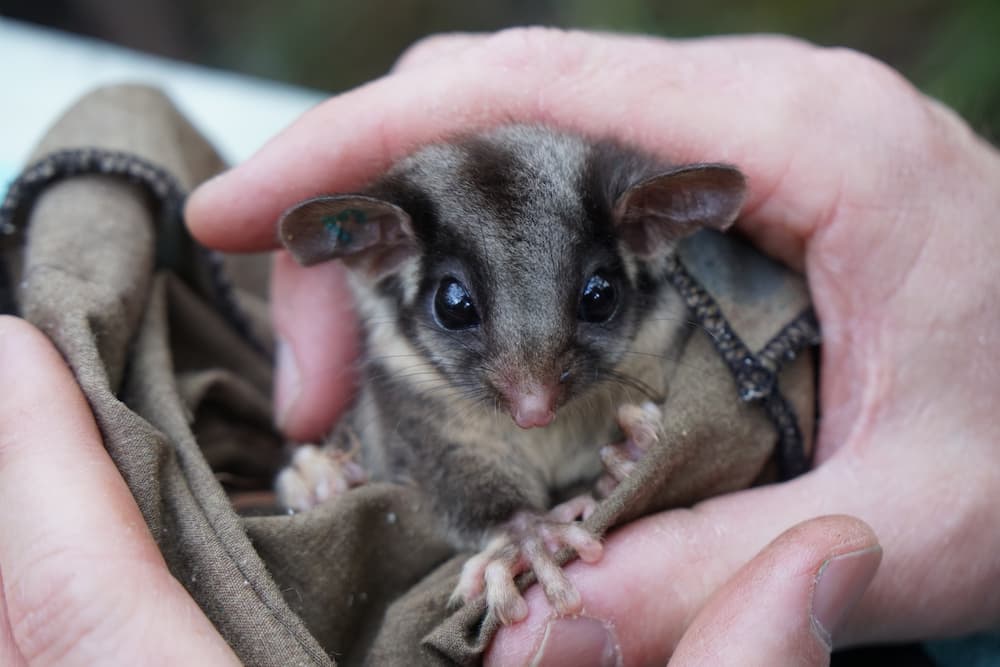The program
The Faunal Emblems Program is helping to improve the long-term sustainability of the Leadbeater’s Possum and the Helmeted Honeyeater in the wild.
The Victorian State Government has invested over $8 million since 2018 for a range of targeted actions that will assist populations directly, as well as protecting and restoring crucial habitat.
This program, overseen by DEECA, is funded to complement the current recovery efforts for the Helmeted Honeyeater and Leadbeater’s Possum.

Why these species?
The Leadbeater’s Possum and Helmeted Honeyeater are two of Victoria’s Faunal Emblem’s and are found only in Victoria. Both are listed as ‘Critically Endangered’ under Victoria’s Flora and Fauna Guarantee Act 1998 and the Commonwealth Environment Protection and Biodiversity Conservation Act 1999. The Lowland Leadbeater's Possum and Helmeted Honeyeater live side by side in the Yellingbo (Liwik Barring) Landscape Conservation Area with the Highland Leadbeater’s possums range extending into Victoria’s Central Highlands.

Credit: Zoos Victoria
Faunal Emblems Program Working Group
This program is taking a collaborative approach, with government and non-government partners forming the Faunal Emblems Program Working Group. The Working Group is made up of representatives from Traditional Owners and:
What are we doing?
The 2023-25 Faunal Emblems Program is supporting the following organisations through a number of projects, including;
- DEECA Port Phillip Region is developing best practice genetic management for the faunal emblems species to reduce the threats of inbreeding and increase genetic diversity and growth. In partnership with Monash University, DEECA is supporting research into the genetic rescue of the Helmeted Honeyeater and Lowland Leadbeater’s Possum (LLBP). This project aims to generate background data on genetic diversity and inbreeding for both species, develop indices to monitor their genetic health, and evaluate the success of genetic rescue programs.
- Zoos Victoria and Parks Victoria are working towards establishment of a Safe Haven for Lowland Leadbeater's possum (LLBP) at Haining Farm. Project works include the construction of a predator-exclusion fence, the eradication of cats and foxes, and habitat restoration. Predator control will also be undertaken at the neighbouring Yellingbo (Liwik Barring) Landscape Conservation Area for both the Helmeted Honeyeater and LLBP.
- Zoos Victoria will undertake revegetation at Coranderrk Bushland to create a new suitable release habitat for both the Lowland Leadbeater’s Possum (LLBP) and the Helmeted Honeyeater. This project will use hydrological restoration, revegetation and browser exclusion to improve the condition of 16-hectares of floodplain at Boggy Creek. These improvements will support future release of Helmeted Honeyeater and LLBP populations, increasing the number wild populations of both species.
- Melbourne Water’s habitat restoration project on the Birrarung -Yarra River floodplain will establish 8 ha of new habitat for both the Lowland Leadbeater’s Possum and Helmeted Honeyeater on priority floodplain sites on private land. Detailed, site-specific restoration planning will create high quality habitat with the capacity to act as a translocation site over the next 10-15 years.
- Parks Victoria’s will continue its habitat restoration works at the Yellingbo (Liwik Barring) Landscape Conservation Area. Activities to improve habitat for both the Helmeted Honeyeater will include revegetation, environmental weed control, track work and maintenance, as well as the construction of a deer exclusion fence.
- Parks Victoria will also be undertaking control of Bell Miners at the Yellingbo (Liwik Barring) Landscape Conservation Area. Bell Miners are a key threat to Helmeted Honeyeaters, impacting on vegetation condition and directly competing with Helmeted Honeyeaters for food resources. This project will support targeted Bell Miner control within core Helmeted Honeyeater habitat, another priority action for the long-term recovery of this Critically Endangered Faunal Emblem.
Questions
Where can I find more information on these species?
How can I get involved?
There are many community groups and volunteer organisations working to help protect and raise awareness of these species.
By 2037, we want 5 million Victorians acting to protect the natural environment and we’ve set out our roadmap for achieving this in our recently released Environmental Volunteering Plan.
For information on environmental volunteering please email environmental.volunteering@deeca.vic.gov.au or see the interactive map of Victorian environmental volunteering groups.
If you believe you have found a Leadbeater’s Possum, please follow the community survey standards here. These standards are what is used by targeted surveys to detect presence of Leadbeater’s Possums in the wild.
You can also contact one of the many community groups such as, Landcare or Friends groups who are working to help protect and raise awareness of these, and many other species.
Volunteers are required to provide supplementary feed to the Helmeted Honeyeaters within Yellingbo Nature Conservation Reserve, record observations, and assist with the capture of birds for banding. Through working as a "supplementary feeder", volunteers have the opportunity to share and develop their skills, and the reward of knowing they are contributing to the conservation of Victoria's threatened species.
How can I find out more about this program?
Contact DEECA or keep an eye on this page for updates on the program.
- DEECA general enquiries: 136 186
- VicEmergency Hotline: 1800 226 226
- Icon Species Grants Team: enviro.grants@deeca.vic.gov.au
Page last updated: 05/05/25